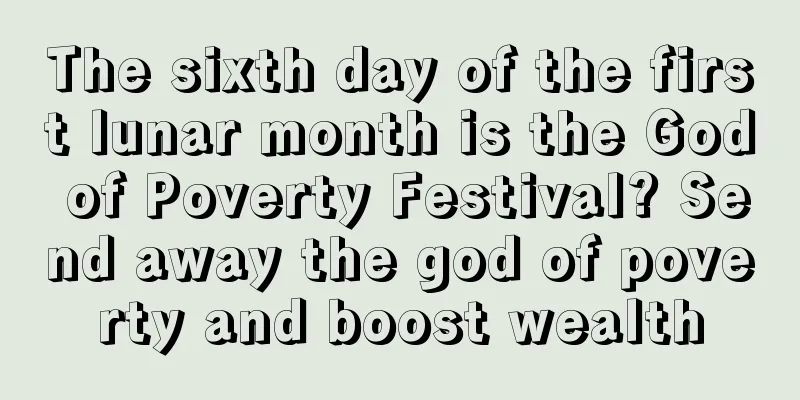The sixth day of the first lunar month is the God of Poverty Festival? Send away the god of poverty and boost wealth

Introduction: The Spring Festival is a festival that lasts for a period of time, and each day has its own customs and significance. The sixth day of the first lunar month is commonly known as "Horse Day", which is the day for people to "send away the God of Poverty". Why do we send away the God of Poverty on the sixth day? Who is the God of Poverty? How to send away the God of Poverty? With these questions, please follow the editor to learn more! The new year brings new hope and there are countless topics to talk about the Spring Festival. If you want to know more about the Lunar New Year, please continue to pay attention to Mr. Shui Mo’s exclusive Spring Festival special articles for you!The sixth day of the first lunar month is the Horse DayGo to the fields to prepare for spring plowing, and send the poor spirit out the door.The sixth day of the first lunar month is called “Sending Away Poverty”It is a very distinctive seasonal custom among the ancient Chinese people. The meaning is to send away the poor ghost (the god of poverty). A poor ghost, also known as a "poor son". According to the "Wenzong Beiwen" quoted in "Sui Shi Guang Ji" by Chen Yuanliang of the Song Dynasty, "During the reign of Emperor Zhuanxu and Emperor Gao Xin, a son was born in the palace. He did not wear complete clothes and was known as the poor son in the palace.The sixth day of the first lunar month was called Yifei in ancient times.People really start working or doing business on this day. Since the beginning of the first month of the lunar year, the toilet cannot be cleaned until the fifth day, and feces accumulate in the toilet. So on this day, a thorough cleaning is done, and sacrifices are made to the toilet god to clean the usually dirty toilet. That’s why it’s called “挹肥” (but nowadays most families use new bathroom equipment, so this custom no longer exists). This day also represents the day when farmers in the old days began to go to the fields to prepare for spring ploughing. A Lunar New Year custom song circulated among the people of Guangzhou mentions "The first day of the first lunar month is to worship gods, the second day is to worship people, the third day is the poor ghost's day, the fourth day is to beg for rice, the fifth and sixth days are the New Year, the seventh day is to look for spring, the eighth day is not to come back, the ninth day is to have nothing, the tenth day is to beat spring, the eleventh day is to beat children, the twelfth day is to set up the lantern shed, the thirteenth day is to turn on the lanterns, the fourteenth day is to be brightly lit, the fifteenth day is to pray after the lanterns are lit, and the fifteenth day is to pick green to drive away all diseases." As the saying goes, on the sixth day of the Lunar New Year, pray for good luck and get rid of the poor ghost. "Sending away poverty" on the sixth day of the first lunar month is a very distinctive seasonal custom among the ancient Chinese people. The meaning is to offer sacrifices to the poor ghost (the god of poverty), also known as the "poor son".Who is the God of Poverty?In "Records of Jingu Garden" by Li Yong, a writer of the Tang Dynasty, it is said: "The son of Gaoyang was thin and frugal. He liked to wear tattered clothes and eat gruel. When people made new clothes for him, he would tear them and wear them after burning them. People in the palace called him the Poor Son. He died in the alley on the last day of the first lunar month. Nowadays, people make gruel and throw away the tattered clothes. On this day, they offer sacrifices to him in the alley, which is called sending away the Poor Ghost." According to "Sui Shi Guang Ji" by Chen Yuanliang of the Song Dynasty, citing "Wen Zong Bei Wen", it is recorded: "During the time of Zhuanxu Gao Xin, a son was born in the palace. He did not wear complete clothes. People in the palace called him the Poor Son. Later, he died on the last day of the first lunar month. People in the palace buried him and said to each other, 'Today we send away the Poor Ghost.'" According to folk legend, the Poor Ghost is the son of the ancient emperor Zhuanxu. He was weak and short, and liked to wear tattered clothes and eat porridge. Even if he was given new clothes, he would tear them or burn holes in them before wearing them. Therefore, everyone called him "the poor son." On the last day of the first lunar month, Qiongzi died. The palace servants buried him and said, "Today we send Qiongzi off." From then on, Qiongzi became a poor ghost that everyone feared. According to Mr. Qian Zhongshu's "Guan Zhui Bian", the custom of sending away "poor ghosts" became popular among the people in my country during the Tang Dynasty, but they only called them "ghosts" instead of "gods". After the Ming and Qing Dynasties, the "poor ghost" was revered as the "poverty god". No one can tell whether it is a god or a ghost. The custom of sending away poverty was quite popular in the Tang Dynasty. The great writer Han Yu once wrote an essay "Sending Away Poverty", in which he said: "(The host) bowed to the poor ghost three times and told him: 'I heard that you are leaving one day. I have the grace to send you off. Are you interested in leaving?'" The Tang poet Yao He also wrote poems "Three Poems to Send Away Poverty on the New Year's Eve", the first of which says: Every year on this day, I pour wine and worship in the street. Looking at thousands of households and doors, everyone is sending away poverty. From the last two sentences we can see that the custom of sending away poverty was quite common at that time. After the Song Dynasty, the custom of sending away poverty remained popular. In the Qing Dynasty, Yu Quyuan's "Three Notes from the Tea Fragrance Room: Sending Away the Poor Ghost" recorded the lyrics of people from the previous dynasty: I advise the young man and the young lady to send away the poor ghost with nothing.Summary: The above article introduces in detail the custom of sending away the God of Poverty on the sixth day of the first lunar month. I hope you can learn more about it. I wish all readers good luck and good fortune in the new year! After reading this article, there are more exciting content in the Spring Festival special topic, let’s take a look! |
<<: Is it suitable to move house on the eighth day of the first lunar month in 2017?
>>: Are there any customs for celebrating the Spring Festival in Guangdong?
Recommend
What are the Christmas taboos? What should you pay attention to when giving Christmas gifts?
Today Christmas is no longer just a Western holid...
Is it okay to sign the contract on the second day of the third lunar month in 2020? What time is suitable for signing the contract?
It is also necessary to choose a good time to sign...
What day is the day before the summer solstice in 2022? Is it a good day for everything to go well?
The summer solstice is a critical time node, and t...
What gift should I buy for my boyfriend’s parents on New Year’s Eve 2018?
Chinese New Year is one of the most important even...
When is the Cold Dew in 2018? How can we maintain our health during the Cold Dew?
The 24 solar terms are an ancient timekeeping cale...
What is the date of the ninth day after Grain in Ear in 2020? Which zodiac sign is in conflict with Grain in Ear on June 5, 2020?
Introduction: Grain in Ear is one of the 24 solar ...
Can I move on October 23rd of the lunar calendar in 2021?
Speaking of moving, I believe everyone is familiar...
Is there anything we should pay attention to in the twelfth month of the lunar calendar in 2020?
Is there anything we should pay attention to in th...
Is the 16th day of the first lunar month in 2018 suitable for opening a business?
In our country, we pay attention to auspicious day...
What's your zodiac sign if you were born in April of the lunar calendar? The advantages and disadvantages of the zodiac signs
Speaking of zodiac signs, I believe everyone is fa...
Is April 22nd of the lunar calendar 2019 a good day? Can I sign the contract?
Is April 22nd of the lunar calendar 2019 a good da...
What zodiac sign does a baby born on the seventh day of the fourth lunar month in 2022 belong to?
The fourth month in the lunar calendar is the Si m...
Is the Winter Solstice of 2019 a day of Sui Po? How to resolve the day of Sui Po?
Introduction: In the lunar calendar, there is a sa...
Is it possible to sign the contract on the third day of the fifth lunar month in 2019?
The ancient Chinese people also used the twelve Ea...
Is it possible to pray for an offspring on the 26th day of the seventh lunar month in 2019? When is the due date?
The seventh month of the lunar calendar is commonl...









